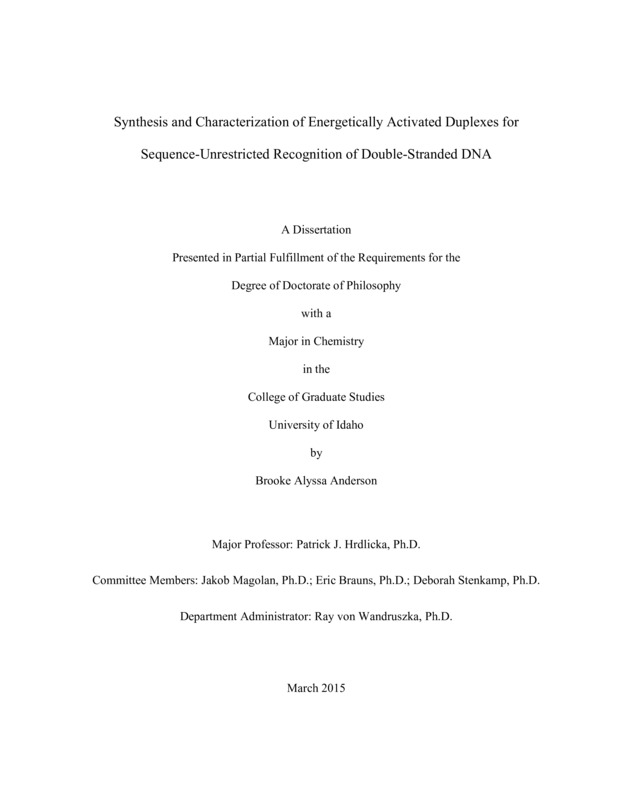Synthesis and Characterization of Energetically Activated Duplexes for Sequence-Unrestricted Recognition of Double-stranded DNA
Anderson, Brooke Alyssa. (2015). Synthesis and Characterization of Energetically Activated Duplexes for Sequence-Unrestricted Recognition of Double-stranded DNA. Theses and Dissertations Collection, University of Idaho Library Digital Collections. https://www.lib.uidaho.edu/digital/etd/items/anderson_idaho_0089e_10146.html
- Title:
- Synthesis and Characterization of Energetically Activated Duplexes for Sequence-Unrestricted Recognition of Double-stranded DNA
- Author:
- Anderson, Brooke Alyssa
- Date:
- 2015
- Keywords:
- DNA Nucleic Acid Chemistry Oligonucleotide Chemistry Organic Chemistry
- Program:
- Chemistry
- Subject Category:
- Chemistry; Biochemistry; Organic chemistry
- Abstract:
-
The main purpose of the work described in this dissertation is to develop oligonucleotide-based probes that can target genomic DNA. The development of probes capable of interrupting the flow of genetic information in living organisms have become an interesting field of research due to their potential as diagnostic and fundamental research tools, and - the grand challenge - therapeutics that can combat diseases of genetic origin. There is an extensive need to expand the current toolbox of double-stranded DNA (dsDNA) targeting probes to enable high specificity targeting at physiologically relevant conditions without sequence limitations. The Hrdlicka lab focuses on the development of a novel DNA targeting methodology utilizing energetically activated DNA duplexes, which potentially overcome the limitations of current DNA recognition strategies (e.g., triplex-forming oligonucleotides, polyamides, and peptide nucleic acids). This approach originally utilized N2'-pyrene-functionalized 2'-amino-alpha-L-LNA nucleotides as the key activating modifications. However, these building blocks are synthetically difficult to make impeding the full characterization of this novel DNA recognition strategy. Identification of simpler and more readily accessible scaffolds therefore presented itself as a highly desirable goal in order to conduct structure-property relationship studies with the aim of optimizing the dsDNA binding affinity of Invader probes. The work presented in this dissertation describes the synthesis and characterization of oligonucleotides and Invader probes based on (i) N2'-pyrene-functionalized 2'-amino-alpha-L-LNA adenosine, (ii) N2'-pyrene-/perylene-/coronene-functionalized 2'-N-methyl-2'-aminouridine monomers, to study the influence of intercalator size on dsDNA recognition efficiency, (iii) phosphorothioate DNA backbones, to improve pharmacokinetic properties, (iv) S2'-pyrene-functionalized 2'-thiouridine, to study the effect of electronegativity of the 2'-sugar atom on DNA recognition efficiency, (v) pseudo-complementary Invader building blocks, to further increase the binding affinity of Invader probes. The long-term goal of this research project is to develop simple nucleic acid probes that allow for sequence-unrestricted targeting of double-stranded DNA and to apply these probes as tools in molecular biology, nucleic acid diagnostics, and novel gene therapeutics.
- Description:
- doctoral, Ph.D., Chemistry -- University of Idaho - College of Graduate Studies, 2015
- Major Professor:
- Hrdlicka, Patrick J
- Committee:
- Magolan, Jakob; Stenkamp, Deborah; Brauns, Eric
- Defense Date:
- 2015
- Identifier:
- Anderson_idaho_0089E_10146
- Type:
- Text
- Format Original:
- Format:
- application/pdf
- Rights:
- In Copyright - Educational Use Permitted. For more information, please contact University of Idaho Library Special Collections and Archives Department at libspec@uidaho.edu.
- Standardized Rights:
- http://rightsstatements.org/vocab/InC-EDU/1.0/

